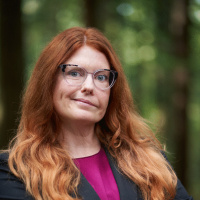
Curious? asks April Van Dyke…
Jury Panel Make Up
In your recent campaign speech you tell an anecdote of being in a Humboldt County Jury Trial where out of 117 potential jurors only one was the same race as your client. Does a jury of your peers exist if your peers don’t show up? Do you believe people of different races can’t be peers? What are your concrete plans to increase minority and BIPOC participation in Jury Duty?
— Curious?
Response

April Van Dyke
Thank you for this thoughtful question. I do think a client of color can have a jury of their peers when the jury is comprised of white jurors. For example, I did an excessive force trial where I represented a black man. There were only three jurors of color in the jury pool. Opposing counsel used their challenges to remove those jurors. I objected to the removal of those jurors, but the judge overruled that objection. My client was understandably nervous that the jury deciding his fate did not look like him. In the end the jury found that excessive force was used against my client. This example illustrates how a jury of your peers can be comprised of all different races, but I want to be cautions.
I do think we cannot forget the troubling history in our country of all white juries deciding the fate of people of color. It was not that long ago that women and people of color were not allowed to serve as jurors. I think the least we can hope for is for jurors to be roughly proportionate to our community.
Now to the solution. I understand that you can’t have a proportionate racial makeup on a jury if people of color do not respond for jury service. This is where we can really make a difference. I think it starts with the same outreach that folks currently do in communities of color with respect to voting. As a judge I would like to engage with Eureka NAACP, Black Student Unions and the Tribes to name a few in order to stress the importance of showing up to jury service. Those communities often feel disconnected from our civic society and feel like democracy and justice is not for them. We must connect with those communities and make them feel heard, important, and listened to, but also empowered to participate in our legal system.
